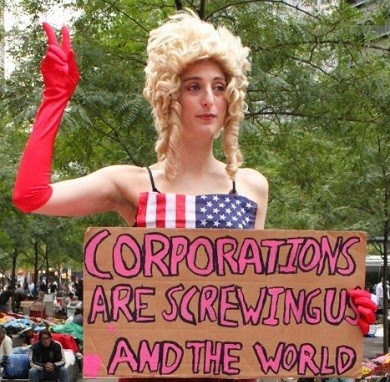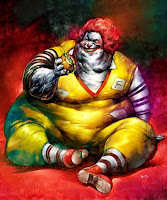Up, Down, Postscript.
Music this week, first and last, from The Doors. First: People Are Strange.
  |
 Wall Street is Occupied!
Wall Street is Occupied!From what I can see these guys at least know how to organize it - general assemblies (lower case intentional), food committees ... and they are still there a week later.
There are lots of videos, this one's a good start, and this one, I Am the 99%. Some crazies, some incoherence, some clear thinking - all good - I wish I was there, I might just fit in.
"I don't know if we can do it. But if we can't do it we are doomed as a species."
The police got very ugly already - and they are still there.
Good on them.
You can send them an 'Occu-pie' pizza from Liberatos Pizza right from the comfort of whatever chair you put in front of the computer deity in your household.
Go Ahead! Send them a pizza!
Just do it!


 Gable gets it half-right again. He is, as he so often is, close but no cigar (Once! Twice! Thrice!). I'll leave you to figgure out how exactly if you're interested.
Gable gets it half-right again. He is, as he so often is, close but no cigar (Once! Twice! Thrice!). I'll leave you to figgure out how exactly if you're interested.There is some news of the Wall Street occupation, with some pictures, in the NYT (but not on the front page of course). The newspapers, so called 'liberal' or not, all know who butters their bread - and it ain't the 99%.
 A-and Gwynne Dyer reappears as a purveyor of KY jelly: Geo-engineering takes off to cool Earth's surface. The true seat of fear is in the prostate apparently - bend over, this won't hurt a bit.
A-and Gwynne Dyer reappears as a purveyor of KY jelly: Geo-engineering takes off to cool Earth's surface. The true seat of fear is in the prostate apparently - bend over, this won't hurt a bit.Doh! One after the other these people tip in the direction of easy. Wazizname ... the maudlin clue from the Munk debate? ... George Monbiot; then there was the nimby Gaia promoter ... James Lovelock; and now the last clear-headed Newfie, Gwynne Dyer - not exactly news, he made it clear in Climate Wars, but still ... Oh well.

 There was a typo in my transcription of Ivan Illich's exegesis on the Good Samaritan (which I have fixed). In the process I looked into getting the source of this quotation from (I thought) Jacques Maritain.
There was a typo in my transcription of Ivan Illich's exegesis on the Good Samaritan (which I have fixed). In the process I looked into getting the source of this quotation from (I thought) Jacques Maritain."Au lieu d'un chateau fort dressé au milieu des terres, il faudrait penser a l'armée des étoiles jetées dans le ciel."
According to Charles Taylor it is on page 396 of this book by Jean-Luc Barré: Les mendiants du Ciel, 1996; Beggars for Heaven translated by Bernard Doering, 2005.
So, it is not clear that the quotation is directly from either Jacques or Raïssa, and the book is not in the library, even in translation, and a used copy is beyond my budget, so ... a quandary. I'm working on it.
Some are setting out to beatify these people, knuckleheads, and worse than knuckleheads - they'll just never learn.
| Daddy You do not do, you do not do Any more, black shoe In which I have lived like a foot For thirty years, poor and white, Barely daring to breathe or Achoo. Daddy, I have had to kill you. You died before I had time ---- Marble-heavy, a bag full of God, Ghastly statue with one gray toe Big as a Frisco seal And a head in the freakish Atlantic Where it pours bean green over blue In the waters off the beautiful Nauset. I used to pray to recover you. Ach, du. In the German tongue, in the Polish town Scraped flat by the roller Of wars, wars, wars. But the name of the town is common. My Polack friend Says there are a dozen or two. So I never could tell where you Put your foot, your root, I never could talk to you. The tongue stuck in my jaw. It stuck in a barb wire snare. Ich, ich, ich, ich, I could hardly speak. I thought every German was you. And the language obscene An engine, an engine, Chuffing me off like a Jew. A Jew to Dachau, Auschwitz, Belsen. I began to talk like a Jew. I think I may well be a Jew. The snows of the Tyrol, the clear beer of Vienna Are not very pure or true. With my gypsy ancestress and my weird luck And my Taroc pack and my Taroc pack I may be a bit of a Jew. I have always been scared of you, With your Luftwaffe, your gobbledygoo. And your neat mustache And your Aryan eye, bright blue. Panzer-man, panzer-man, O You ---- Not God but a swastika So black no sky could squeak through. Every woman adores a Fascist, The boot in the face, the brute Brute heart of a brute like you. You stand at the blackboard, daddy, In the picture I have of you, A cleft in your chin instead of your foot But no less a devil for that, no not Any less the black man who Bit my pretty red heart in two. I was ten when they buried you. At twenty I tried to die And get back, back, back to you. I thought even the bones would do. But they pulled me out of the sack, And they stuck me together with glue. And then I knew what to do. I made a model of you, A man in black with a Meinkampf look And a love of the rack and the screw. And I said I do, I do. So daddy, I'm finally through. The black telephone's off at the root, The voices just can't worm through. If I've killed one man, I've killed two ---- The vampire who said he was you And drank my blood for a year, Seven years, if you want to know. Daddy, you can lie back now. There's a stake in your fat black heart And the villagers never liked you. They are dancing and stamping on you. They always knew it was you. Daddy, daddy, you bastard, I'm through. | Doug Ford would not recognize Margaret Atwood if he saw her on the street - this has now been rectified I understand, they have been introduced somehow - and it's probably a safe bet that Rick Perry has not read Sylvia Plath. But they are making a stamp of her. Ho hum. But they are making a stamp of her. Ho hum.How many theses have been written around this poem I wonder? I remember Keith reading it aloud in an english class long ago: "Ich, Ich, Ich." And the implicit 'Du' reiterated in every blue rhyme. An inversion of Buber's I/Thou ... a daemonic inversion I suppose ... such a clear window into such a dark abyss.  I am certain that I have said all this before. But my memory and this crutch of a blog are now insufficient to help me find where that was (?) ... once here in 2005 but that's not it ... Oh well. I am certain that I have said all this before. But my memory and this crutch of a blog are now insufficient to help me find where that was (?) ... once here in 2005 but that's not it ... Oh well.I am posting it here today to dot the i's and cross the t's on the Toronto companheira who didn't like being addressed as a lady. How was I to know? Why not say it the first time? Why save it for some kind of implicit cadence? We mistake the poet for her poetry, and her poetry for something else - say, the Zeitgeist - and soon it comes ready-made instead of bespoke, doctrine carved in stone on the cathedral walls - picked out in gold leaf, wisdom of the age, handed down ... and so on.  How anyone can imagine that correctitude will help the movement coalesce into something that can turn the tide I do not know. How anyone can imagine that correctitude will help the movement coalesce into something that can turn the tide I do not know.Instead it splinters into ever finer and finer shards; too often governed by "Look at ME!" The organizers are all giddy counting has-been endorsements and contingent promises. What can we possibly learn in 8 hours of 'training'? I don't know. | ||


 So, as I get ready to head off for Ottawa I feel hopeless. Even accompanied as I am this time by my son and nephew - indeed, it could be as simple as commitments made to them that takes me out the door at all.
So, as I get ready to head off for Ottawa I feel hopeless. Even accompanied as I am this time by my son and nephew - indeed, it could be as simple as commitments made to them that takes me out the door at all.More and more I prefer to skip a day whenever I can possibly get away with it - just ... stay in bed with a book. And there have been two truely excellent ones this week.
 When I first became dissatisfied with the Father God nonsense, and with Jesus, meek and mild, someone said to me to go looking into my own heritage then - the Viking originators of 'fuck' ... but I never really did get around to it. It was so comfortable to be shining with Jesus: "You in your small corner, and me in mine," and much too difficult to try walking around the KJV - I was never up for it, not enough jam.
When I first became dissatisfied with the Father God nonsense, and with Jesus, meek and mild, someone said to me to go looking into my own heritage then - the Viking originators of 'fuck' ... but I never really did get around to it. It was so comfortable to be shining with Jesus: "You in your small corner, and me in mine," and much too difficult to try walking around the KJV - I was never up for it, not enough jam.Antonia Susan (A.S.) Byatt seems to have had the right stuff though: Ragnarok: the end of the gods, 2011.
I found the last two chapters here: A.S. Byatt - Ragnarok, The End of the Gods (excerpts).
She ends with: "As it is, the world ends because neither the all too human gods, with their armies and quarrels, nor the fiery thinker know how to save it."
 If we are walking to the end, running, whatever, it is just as well to look straight at it, to see it for what it is - even from somewhat to the side - and this Ragnarök is the clearest view I have seen yet.
If we are walking to the end, running, whatever, it is just as well to look straight at it, to see it for what it is - even from somewhat to the side - and this Ragnarök is the clearest view I have seen yet.And Madeleine Thien as well (two in a week ... Imagine!): Dogs at the Perimeter, 2011.
On the most trivial level (f'rinstance); here is a woman who can write a character who strikes her child. The photograph is included to assure all that she appears otherwise normal.
 It looks like they got the killers of Zé Cláudio and his wife Maria. These two, Lindonjonson Silva Rocha and José Rodrigues Moreira, are (apparently) small-time contract killers. The instigators, their paymasters, are still walking around.
It looks like they got the killers of Zé Cláudio and his wife Maria. These two, Lindonjonson Silva Rocha and José Rodrigues Moreira, are (apparently) small-time contract killers. The instigators, their paymasters, are still walking around.These photographs are at reasonably high resolution - click on them, look closely at these men, they do not have two heads or forked tongues, either of them.
 Several news articles in Portuguese:
Several news articles in Portuguese:Polícia prende no Pará irmãos acusados de assassinar casal extrativista, Altino Machado, 18/09/2011.
Polícia prende no Pará irmãos acusados de assassinar casal extrativista, Altino Machado, domingo, 18 de setembro de 2011.
Acusados de assassinar casal de extrativistas são transferidos para Belém, Altino Machado, domingo, 18 de setembro de 2011.
Irmãos negam assassinato de casal de ambietalistas, 20/09/2011.
Irmãos negam assassinato de ambientalistas, Diário do Pará, 20/09/2011.
And one in English (Lo and behold!):
Brazil police arrest suspects in Amazon killings, AP, 18/09/2011.
I get no help thinking: Either it is what it is, or: It is more (or less) than it is ... and it remains always possible I guess that without at least some fiction of something transcendental, life cannot be lived? Depending upon how strong and original you really are. Whatever ...
 And for the last, The Doors again: The End.
And for the last, The Doors again: The End.I am wondering if I might not just stay in jail if they are fool enough to put me there? If not I will report here with first-hand photographs maybe.
Be well gentle reader.
  |
"I would like to be remembered as a judge who didn’t shy away from the most difficult issues but tackled them head on with blunt honesty. Beyond that, if it doesn’t sound too corny, I think what my decisions show is a profound belief in a decent and civilized society where the law affords people as much scope as possible to make whatever they can of themselves, but an equally deep belief that the people have to take responsibility for whatever it is that they decide to do."
Ian Binnie.
What do you say now?: "... I mean really. What are we coming to? We’re coming to the end, I hope."
The end of what? : "The world."
Do you feel apocalyptic?: "I do. A lot of people do. But it’s become rather a cliché. When was the world supposed to end last, two months ago or whatever? It was a lovely thought."
Maurice Sendak.
Down.









